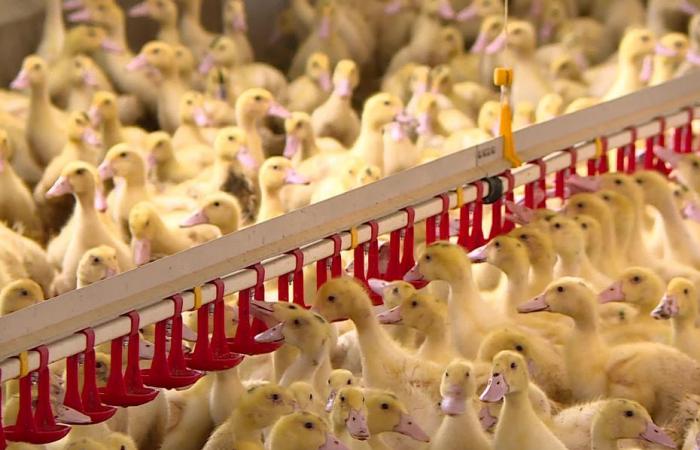A week after the identification of a first outbreak of avian flu on a farm in Saint Etienne d'Orthe in the Landes, a second outbreak of the disease was revealed, on November 13 in the same town, also in a breeding of vaccinated ducks.
The essentials of the day: our exclusive selection
Every day, our editorial team reserves the best regional news for you. A selection just for you, to stay in touch with your regions.
France Télévisions uses your email address to send you the newsletter “Today’s essentials: our exclusive selection”. You can unsubscribe at any time via the link at the bottom of this newsletter. Our privacy policy
Avian flu has once again struck in the Landes. This November 14, it is once again a breeding in Saint Etienne d'Orthe which is affected, announces the prefecture. In accordance with regulations, these animals from another farm in Saint Etienne d'Orthe had nevertheless been vaccinated against highly pathogenic avian influenza (HPAI).
This detection comes one week after a first detection in the same municipality. This is why an epidemiological investigation is currently being carried out by the services of the DDETSPP (Departmental Directorate of Employment, Labor, Solidarity and Population Protection), “to determine in particular whether epidemiological links exist between the two outbreaks.
The Landes prefecture indicates that to prevent the spread of the virus, “a euthanasia operation for the 6,000 animals present on the farm is being implemented from November 14.”. It ensures that the State services, and in particular the staff of the DDETSPP, “have been mobilized alongside the breeder since the outbreak was declared“, especially at the time of slaughter.
In this context, the prefect, Françoise Tahéri, renews “its call for strict compliance, by each actor in the sector, with all biosecurity and surveillance measures falling within its
responsibility”.
This second identification in the Landes comes in the context of a very recent rise in the level of epizootic risk (to its maximum level in mainland France) since November 9. A situation due, according to the press release from the Landes prefecture, to a “strong and persistent dynamic of the circulation of the virus in wildlife in Europe, particularly migratory in the migration corridors crossing France.
Despite the presence of avian flu, we also remember that “the consumption of meat, foie gras and eggs does not present any risk to human health”.
The prefecture reminds that the surveillance perimeter remains the same, according to the prefectural decree of November 7, 2024, around the first outbreak remains applicable, without modification:
- a protection zone, within a 3 km radius of the first outbreak, concerns 8 municipalities
Landes (Orist, Pey, Port-de-Lanne, Saint-Etienne-d'Orthe, Saint-Jean-de-Marsacq, Saint-Lon-Les-Mines, Sainte-Marie-de-Gosse and Saint-Martin-de- Hinx). - a surveillance zone, within a 10 km radius of this outbreak, concerns 20 municipalities
Landes Bélus, Biarrotte, Biaudos, Cagnotte, Cauneille, Hastingues, Heugas, Josse, Oeyregave, Orthevielle, Peyrehorade, Rivière-Saas-et-Gourby, Saint-André-de-Seignanx, Saint-Geours-de-Maremne, Saint-Laurent -de-Gosse, Saint-Vincent-de-Tyrosse, Saint-Vincent-de-Tyrosse, Saubrigues, Saubusse, Siest and Tercis-les-Bains).
A protection zone concerns municipalities within a diameter of 3 kilometers and surveillance over 10 kilometers (illustration).
•
© André Abalo / France Télévisions
Knowing that in these areas, “all places where poultry and captive birds are kept are subject to specific requirements”. All are prohibitedmovements of poultry and other captive birds, and any introduction of new animals of this type“, unless an exemption is granted by State services.
Self-checks are “made obligatory by prefectural decree” with a view to strengthening surveillance of the HPAI virus.
These measures complement the protection provided by the vaccination system deployed on farms since October 2023. They aim primarily to prevent the introduction of the virus from wildlife and through human activities.
The same recommendations apply to individuals who keep backyard and ornamental birds.






